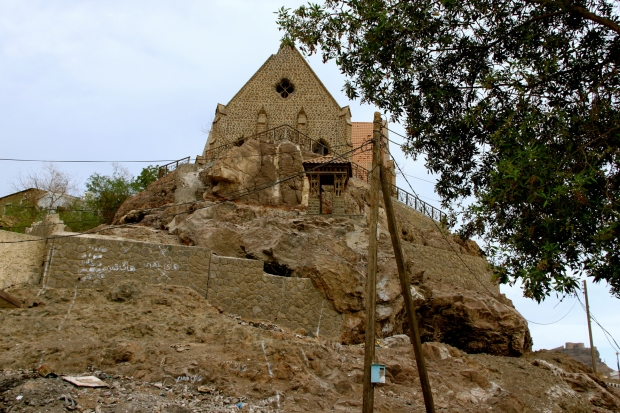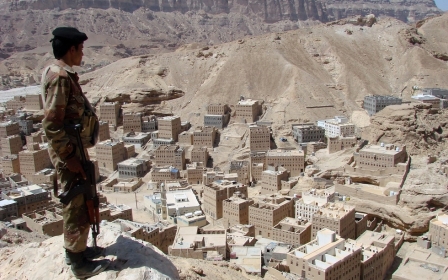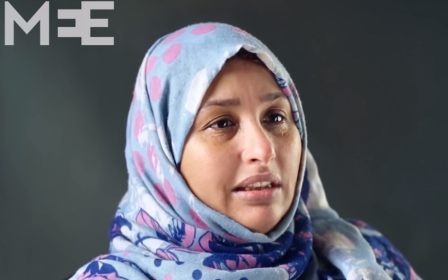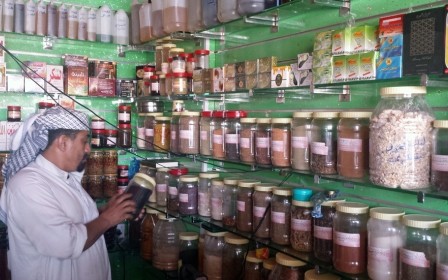Friar Tom Uzhunnalil: No freedom for rare priest in Yemen
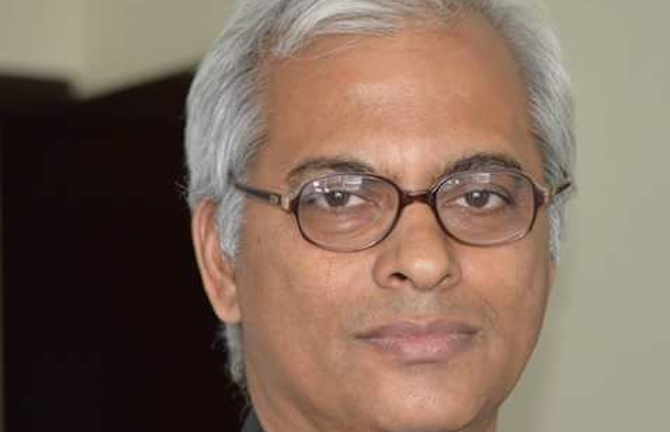
Uncertainty shrouds the fate in Yemen of Indian missionary Friar Tom Uzhunnalil, who is still held by unknown assailants despite recent announcements that he was to be released.
Last weekend, Pope Francis appealed directly to the kidnappers. Earlier this month, India’s External Affairs Minister Sushma Swaraj said he had secured Uzhunnalil's freedom, though the release date and details remain unknown.
The vice provincial at the Salesians of Don Bosco in Bangalore, where Uzhunnalil lived in the years after his ordination, told Middle East Eye he was distressed by the abduction, but said rumors on social media that Uzhunnalil had been crucified were unfounded.
“We are praying for his quick return. This parish is like a family for us and we want to see him safely returned,” he said by phone. “Of course, we are doing everything we can to secure his release.”
But while the faithful continue to hope that Uzhunnalil will be allowed to go home, the case has fuelled concerns that many places in the world, particularly the Middle East, have simply become too dangerous for Christian missionaries and clergy.
The raid in March in which Uzhunnalil was kidnapped was particularly bloody. When armed men stormed Mother Theresa’s Missionaries of Charity in the southern city of Aden - which served as a home for elderly people - they killed 16 people, including four nuns, before abducting Uzhunnalil.
Sister Sally was the only nun to escape unharmed, by hiding in the shelter’s cold storage where the medicines were kept. After leaving Aden, she was stranded at a missionary base in Jordan because India doesn’t have a consulate in the country, making it difficult for her to return.
No group has publicly claimed responsibility for the attack, although both the Islamic State (IS) group and al-Qaeda are known to have built their presence in Aden since it was liberated from Houthi rebels by a Saudi-led coalition.
“He [Uzhunnalil] is a daring and committed person and always put the ministry and mission above everything,” Friar Jose, who has known Uzhunnalil for more than 32 years and worked closely with him in Bangalore, told MEE.
“Many Christians fled after the war started but he stayed and regularly conducted masses for the diminishing Christian community, the elderly and the sisters at the charity.”
The Salesians of Don Bosco, where Uzhunnalil served for 38 years, is a Roman Catholic institute founded in the mid-1800s by Saint John Bosco in Italy to help desperate destitute without access to homes and education.
With more than 32,000 clergy in almost 130 countries, they have a significant presence in the Middle East, but have found it increasingly difficult to operate in many places.
As the only organisation with permission to legally operate in a Muslim-majority nation, the Salesians ran three other centres, in Taiz, Sanaa and Hodeida, in addition to the one in Aden. After war broke out in 2015, their services in Taiz and Hodeida were brought to an end - but they continued to work for the destitute, the elderly, the young and the marginalized communities in Sanaa and Aden.
Demand for their services has grown over the last year, but their ability to work has been restricted as the security situation across Yemen has deteriorated. The IS and al-Qaeda have both stepped up attacks, targeting politicians, mosques and civilians.
It wasn’t always like this. When the revolution erupted in 2011, many Christians chose to stay. As late as March 2015, when the Saudi-led coalition began bombing Houthi positions in Yemen, some churches were holding Sunday masses that were thronged with expatriates from the Philippines, India and the West. Yemeni Christians, who constitute fewer than 10,000 of the 24.5 million population, are mostly converts from Islam, but a large expatriate community made up of workers from Africa and Ethiopian refugees also thrived in the country.
Abdo Elfgeeh, a Yemeni-American who grew up in Yemen, said he has fond memories of Christians and Muslims mingling and living in the same streets in Sanaa.
“Local Muslim majorities protected Christians,” Elfgeeh said.
“We still don't have any clarity on who has done this," Jose said. "We don't know if it is IS or al-Qaeda or any other group.”
Confusion was rife during the attack, with witnesses saying that initially they were unsure why the nuns were being killed and the priest kidnapped. When one man asked, however, the answer could not have been clearer: “They are Christians,” a gunman reportedly shouted.
After the war started last March, the destruction and vandalism of church antiquities has been widespread, prompting the community to decline. The Holy Family church in Aden, where Uzhunnalil said the daily masses, was threatened several times before the final raid. In September, masked assailants set a Roman Catholic church in Aden ablaze.
“Uzhunnalil was aware that bad things could happen, but he stayed regardless. He used to tell the others: we are in danger, be prepared for anything that might happen. Yet knowing all this, he stayed behind in Yemen,” Jose said.
The increase in conflicts across the Middle East and Africa has been bad news for the region’s ancient and also more recent immigrant Christian communities. The roots of the issue are complex, with religious, social and ethnic tensions all playing a part, and anti-colonialist sentiments also running high.
According to Open Doors UK, an organisation devoted to victimised Christians and churches worldwide, persecution against Christians in the region has doubled since 2013, although all minorities have been oppressed amid a surge in violence.
Globally, the UN says that a record 60 million people have been displaced as a result of attacks on the Christian community. Yemen is seen as the 11th most dangerous place in the world to be a Christian, with Iraq in second place, Syria in fifth and Libya in the 10th spot, according to Open Doors World Watch Christian’s persecution list.
Before the exodus from Yemen, Christians were forced from their homes in Iraq and Syria in 2014 to escape IS control. Since the start of the civil war more than a million Christians have fled Syria amid regular attacks, sexual abuse and abduction at the hands of militants, although again all sides have suffered horribly as a result of the violence.
Even in pockets of Iraq, Syria and Yemen free of IS hegemony, the legal system is based on Sharia (Islamic law) and forbids Muslims from leaving Islam, a law that is increasingly enforced.
“The 'cleansing' of Christians from many places in the Middle East will leave less heterogeneous societies and make peaceful societies less likely,” Nick Baines, the Bishop of Leeds, told Middle East Eye.
Missionaries 'risking their lives'
As the climate has grown more hostile, debate has heated up about what role missionaries and priests should play.
Baines said that much “depends for what - or for whom - they are risking their lives”.
On the one hand, “Christians begin with a theology of self-denial and self-sacrifice” and therefore “danger is not necessarily a deterrent to try and help others impacted by war and conflict. But a more serious question is whether by being there they [missionaries and clergy] are putting the lives of others at greater risk,” Baines said.
In Baghdad, Bishop Michael Nazir Ali said he has witnessed nuns working in some of the most precarious churches and communities without any security. When he asked after their safety, they said that theirs was the only service some of these communities could fall back on.
“Of course there is fear and risk to the communities we work in, but if we were scared we would not accomplish anything,” he said.
While there is no simple answer to whether the presence of Christians puts local communities at risk, Nazir Ali said “there are wise Christians and the unwise Christians”.
“Previously, we have had American evangelists who have gone out to Iraq, Pakistan and done unacceptable things,” he said.
On the whole though, he said, vulnerable communities benefit from the missionaries serving the handicapped, the poor and the destitute, meaning that many will continue to do the work irrespective of the risk.
Jose said there is still one priest from the Salesians in Sanaa, Yemen, but refused to disclose his name or whereabouts for reasons of safety.
In Syria, Pascal Bedros of the Focolare order keeps returning to the frontlines in Aleppo, where he has worked to try and alleviate death and destruction since the start of the revolution in 2011. Despite the obstacles, he said he is determined to stay no matter what.
“When we leave in the morning, we are not sure of our return,” he said.
”But young people and children are always trying to find something to celebrate. [And this is] why do we do this – because the sole purpose of being together is a reason to live.”
New MEE newsletter: Jerusalem Dispatch
Sign up to get the latest insights and analysis on Israel-Palestine, alongside Turkey Unpacked and other MEE newsletters
Middle East Eye delivers independent and unrivalled coverage and analysis of the Middle East, North Africa and beyond. To learn more about republishing this content and the associated fees, please fill out this form. More about MEE can be found here.


